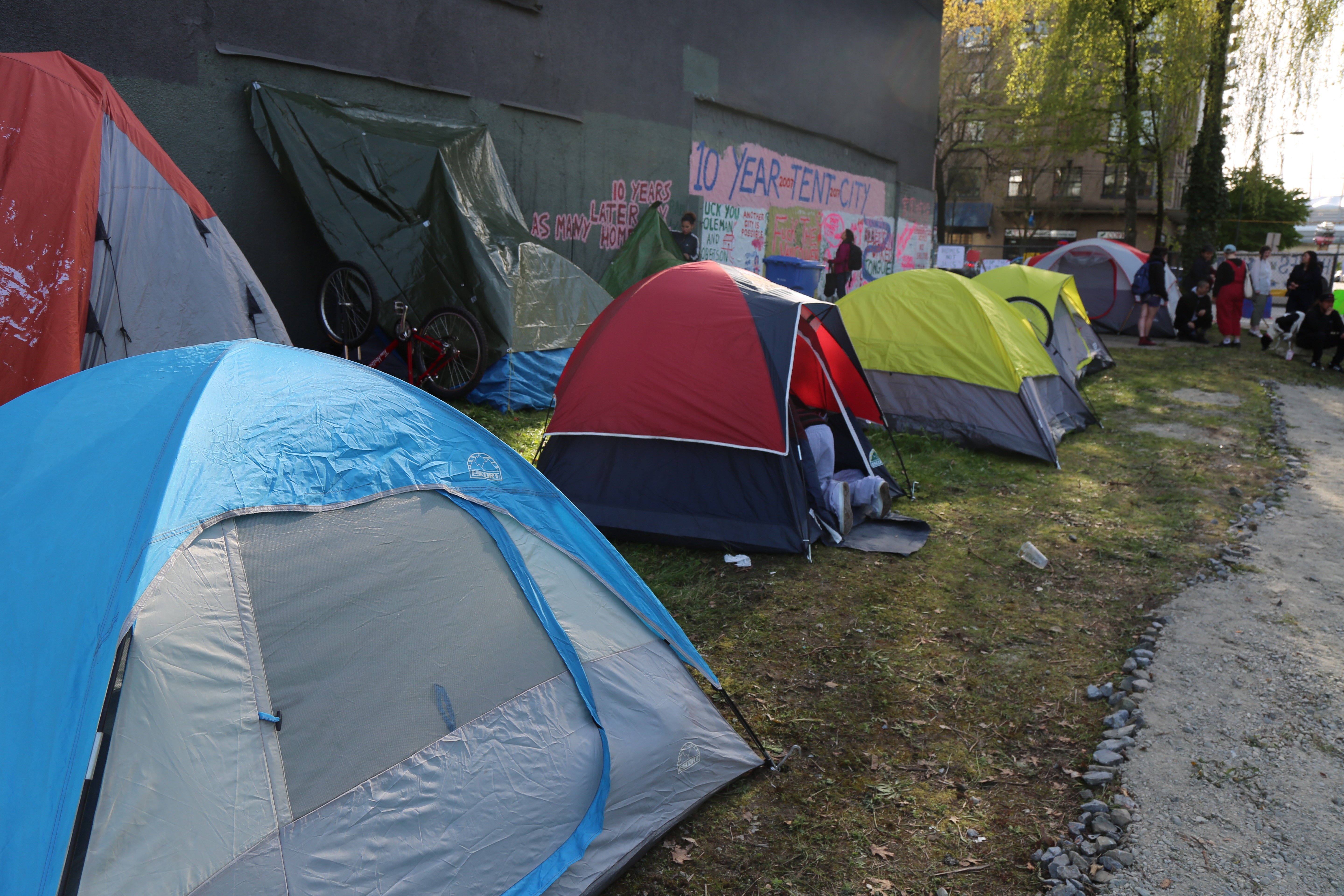Court-sanctioned injunctions that displace and splinter communities of people experiencing homelessness are not evidence-based responses to homelessness. Yet, this appears to be the current policy trend of municipal and provincial governments throughout B.C.
Last week, the District of Saanich announced that it had begun the legal proceedings necessary to obtain a court-ordered injunction to shut down a Saanich tent city known as Camp Namegans. This news came one week after representatives of Nanaimo’s DisconTent City appeared in court to defend themselves against the city’s attempt to secure an injunction.
In 2016, after two court hearings, a court-ordered injunction led to the closing of Super Intent City in Victoria. In 2017, Vancouver’s Ten Year Tent City was successful in blocking the City of Vancouver’s injunction application to dismantle the camp and displace residents. Maple Ridge’s Anita Place has also been the focus of legal proceedings.
Injunctions and litigation will not end homelessness. If injunctions were an effective response to homelessness and a solution to ending tent cities, why are we seeing a growing number of tent cities and court proceedings?
In fact, homeless counts in cities like Vancouver and Victoria have continued to find comparable or increasing numbers of people who are homeless. As well there is ample evidence that conditions such as the high cost of housing and lack of available and culturally appropriate housing options make exiting homelessness difficult and leave tent cities as the only option.
While municipal and provincial governments spend tax dollars on lawyers and legal fees to displace tent cities, residents are fighting for their lives, trying to preserve a measure of stability and safety amidst a national housing and opioid overdose crisis. Pouring money and resources into injunctions for which there is no evidence base goes against the tenets of responsible government. As nurses and researchers, we are aghast at the lack of discussion, promotion and endorsement of evidence-based solutions in responding to tent cities.
There is a wealth of effective solutions to homelessness tailored to meet the needs of a broad range of people impacted by homelessness, as well as the conditions that produce homelessness in the first place. We mention only a few here.
On the supply side of the equation, creation of permanent supportive housing and Housing First programs that integrate harm reduction services are important housing options. Rapid re-housing programs ensure that homelessness is addressed quickly.
On the income side, guaranteed annual income ensures a decent standard of living to reduce poverty and housing subsidies have been found to be highly effective in preventing and ending homelessness.
Effective approaches to homelessness focus on co-ordination between multiple systems such as health, housing and social services to provide important resources and supports necessary for housing stability and ending homelessness. As well, there are an array of programs that prevent discharge to homelessness for those leaving hospital, foster care and the justice system. For Indigenous peoples, ensuring culturally appropriate housing and access to cultural supports have been demonstrated to enhance healing and promotion of well-being as well as housing stability.
We urge municipal and provincial governments to work with tent city residents and invest in solutions that have been demonstrated to end homelessness rather than spend money on ineffective and even harmful responses.
Instead of investing in displacement and dispersement, which will increase social isolation, poor health and harms like overdoses, tent cities should lead to rapid investments in effective evidence-based solutions.
While Super Intent City in Victoria was closed in 2016, it also set a new precedent: governments cannot close tent cities without providing an alternative. In November 2017, the city of Maple Ridge agreed to stop the injunction against Anita Place while the province developed a plan to provide housing solutions and steps were taken to address safety concerns.
We can continue to use the legal system to force governments to provide minimum public health measures and the basic human right of housing, or we can focus immediately on investments in effective solutions.
If we continue a policy of injunctions, we will pay now and pay later. ![]()
Read more: Rights + Justice, Housing
















Tyee Commenting Guidelines
Comments that violate guidelines risk being deleted, and violations may result in a temporary or permanent user ban. Maintain the spirit of good conversation to stay in the discussion.
*Please note The Tyee is not a forum for spreading misinformation about COVID-19, denying its existence or minimizing its risk to public health.
Do:
Do not: